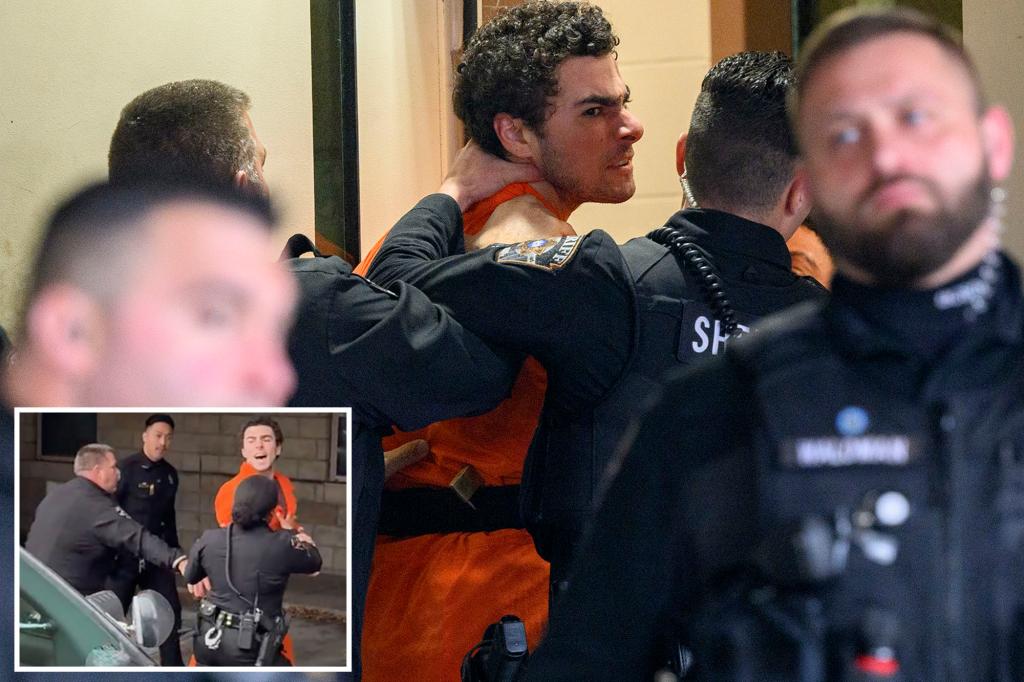The courtroom erupted in a cacophony of shouts and hurried movements as Luigi Mangione, the 26-year-old Maryland resident accused of murdering UnitedHealthcare CEO Brian Thompson, was escorted into a Pennsylvania courthouse for his extradition hearing. Mangione, clad in the stark orange of a prison jumpsuit, vehemently protested his situation, his voice rising above the din. “It’s extremely out of touch and an insult to the intelligence of the American people and the lived experience,” he bellowed to the assembled reporters, his words echoing the frustration and disbelief that seemed to consume him. Officers, their faces grim and determined, struggled to maintain control as they propelled Mangione towards the courthouse doors, his outburst momentarily stalling their progress. The scene, charged with tension and raw emotion, underscored the gravity of the situation and the complex legal battle that lay ahead.
The alleged crime, a shocking assassination that unfolded in the heart of Manhattan, had sent ripples of disbelief and fear throughout the corporate world and beyond. Brian Thompson, a prominent figure in the healthcare industry and the CEO of UnitedHealthcare, had been gunned down, his life abruptly cut short. The details surrounding the killing remained shrouded in mystery, fueling speculation and raising a multitude of unanswered questions. The public grappled with the senseless violence, struggling to comprehend the motives behind such a brazen act. Mangione’s arrest, while offering a semblance of closure, only served to deepen the intrigue, his angry outburst hinting at a narrative yet to be fully revealed.
The extradition hearing, a crucial juncture in the legal proceedings, represented the first formal step in bringing Mangione to face justice in New York, the jurisdiction where the alleged crime took place. The process of extradition, governed by complex interstate agreements and legal precedents, aims to ensure that individuals accused of crimes in one state can be transferred to the appropriate jurisdiction for trial. This intricate legal dance, often involving negotiations between states and extensive paperwork, can be protracted and challenging, potentially delaying the ultimate resolution of the case. Mangione’s vocal protest, though directed at an unspecified grievance, seemed to presage a combative legal strategy, suggesting that he would challenge the extradition process and fight the charges against him every step of the way.
The circumstances surrounding Thompson’s death remained under intense scrutiny, with investigators piecing together the fragments of evidence to construct a comprehensive understanding of the events leading up to the tragic incident. The motive behind the alleged assassination remained a central focus of the investigation, prompting speculation about potential personal grudges, professional rivalries, or perhaps even a random act of violence. The relationship, if any, between Mangione and Thompson was also under investigation, as authorities sought to determine whether there was a pre-existing connection or if the alleged crime was the result of a chance encounter. The complexities of the case, compounded by Mangione’s outburst and the high-profile nature of the victim, ensured that the investigation would remain in the public eye for the foreseeable future.
Mangione’s defiant words, echoing through the courthouse corridors, reverberated throughout the media and public discourse. His claim of an “insult to the intelligence of the American people and the lived experience” invited widespread speculation and interpretation, with commentators and legal experts attempting to decipher the meaning behind his cryptic statement. Some suggested that Mangione was protesting the perceived injustice of the legal system, while others posited that he was hinting at a larger conspiracy or a miscarriage of justice. The ambiguity of his words, however, only fueled further speculation, adding another layer of complexity to an already intricate case.
The legal battle that lay ahead promised to be a protracted and arduous process, with both the prosecution and the defense preparing for a complex legal showdown. The extradition hearing, while a preliminary step, would set the stage for the subsequent trial, where the prosecution would bear the burden of proving Mangione’s guilt beyond a reasonable doubt. The defense, in turn, would likely challenge the evidence presented by the prosecution, attempting to poke holes in their case and raise questions about the reliability of witnesses and the integrity of the investigation. Mangione’s outburst, though seemingly impulsive, could potentially become a factor in the legal proceedings, with the defense potentially arguing that his emotional state at the time of his arrest compromised his ability to understand his rights. The case, already fraught with tension and uncertainty, promised to captivate the nation’s attention as it unfolded in the months and years to come.

